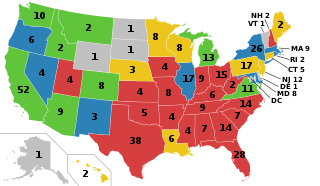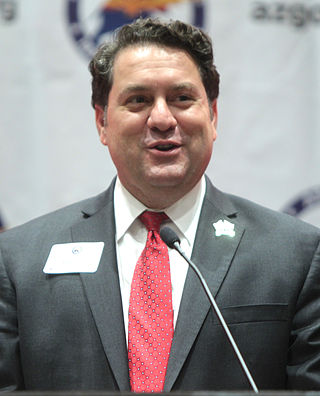Miranda v. Arizona, 384 U.S. 436 (1966), was a landmark decision of the U.S. Supreme Court in which the Court ruled that the Fifth Amendment to the U.S. Constitution restricts prosecutors from using a person's statements made in response to interrogation in police custody as evidence at their trial unless they can show that the person was informed of the right to consult with an attorney before and during questioning, and of the right against self-incrimination before police questioning, and that the defendant not only understood these rights but also voluntarily waived them.
Charles J. "Chuck" Cooper is an appellate attorney and litigator in Washington, D.C., where he is a founding member and chairman of the law firm Cooper & Kirk, PLLC. He was named by The National Law Journal as one of the 10 best civil litigators in Washington. The New York Times described him as "one of Washington’s best-known lawyers." He has represented prominent American political figures, including Attorney General Jeff Sessions, in response to the alleged Russian interference in the 2016 United States elections; Attorney General John Ashcroft; and former National Security Adviser and United States Ambassador to the United Nations John Bolton.

Neal Kumar Katyal is an American corporate lawyer and academic. He is a partner at Hogan Lovells and the Paul and Patricia Saunders Professor of National Security Law at Georgetown University Law Center. During the Obama administration, Katyal served as Acting Solicitor General of the United States from May 2010 until June 2011. Previously, Katyal served as an attorney in the Solicitor General's office, and as Principal Deputy Solicitor General in the U.S. Justice Department. As of 2022, he is a partner of Chamath Palihapitiya Social+capital Partnership and a member of the board of Social Capital Ventures Inc.

The Sandra Day O'Connor College of Law is one of the professional graduate schools at Arizona State University in Phoenix, Arizona. The school is located in the Beus Center for Law and Society on ASU's downtown Phoenix campus. The law school was created in 1965 as the Arizona State University College of Law upon recommendation of the Arizona Board of Regents, with the first classes held in the fall of 1967. The school has held American Bar Association accreditation since 1969 and is a member of the Order of the Coif. The school is also a member of the Association of American Law Schools. In 2006, the law school was renamed in honor of retired United States Supreme Court Justice Sandra Day O'Connor.
The University of Pennsylvania Journal of Constitutional Law is a scholarly journal covering the interdisciplinary study and analysis of constitutional law. The Journal is published in print and electronically by an organization of second- and third-year J.D. students at the University of Pennsylvania Law School. It is one of the top three constitutional law journals and top fifty law journals in the United States based on citations and impact. Additionally, it is the third most cited non-Law Review journal in the United States.
United States v. Kagama, 118 U.S. 375 (1886), was a United States Supreme Court case that upheld the constitutionality of the Major Crimes Act of 1885. This Congressional act gave the federal courts jurisdiction in certain Indian-on-Indian crimes, even if they were committed on an Indian reservation. Kagama, a Yurok Native American (Indian) accused of murder, was selected as a test case by the Department of Justice to test the constitutionality of the Act.
Home Building & Loan Association v. Blaisdell, 290 U.S. 398 (1934), was a decision of the United States Supreme Court holding that Minnesota's suspension of creditors' remedies was not in violation of the Contract Clause of the United States Constitution. Blaisdell was decided during the depth of the Great Depression and has been criticized by modern conservative and libertarian commentators.
United States v. Winstar Corp., 518 U.S. 839 (1996), was a decision by the United States Supreme Court which held that the United States Government had breached its contractual obligations. The court in Winstar rejected the Government's "unmistakability defense"—that surrenders of sovereign authority, such as the promise to refrain from regulatory changes, must appear in unmistakable terms in a contract in order to be enforceable.
Arizona v. Youngblood, 488 U.S. 51 (1988), is a United States Supreme Court case concerning the limits of Constitutional due process in criminal law.
Zobrest v. Catalina Foothills School District, 509 U.S. 1 (1993), was a case before the United States Supreme Court.
Arizona Free Enterprise Club's Freedom Club PAC v. Bennett, 564 U.S. 721 (2011), is a decision by the Supreme Court of the United States.
Arizonans for Official English v. Arizona, 520 U.S. 43 (1996), was a United States Supreme Court decision that held that Article III required standing for each stage of litigation, rather than just when a complaint is filed.

The U.S. state of Arizona, in common with the other U.S. states, must redraw its congressional and legislative districts every ten years to reflect changes in the state and national populations. Redistricting normally follows the completion of the United States census, which is carried out by the federal government the first year of every decade; the most recent census took place in 2020. Historically, Arizona's legislature had control over the redistricting process. However, Proposition 106, passed in 2000, delegated the power to draw congressional and legislative boundaries to a bipartisan independent commission. The Arizona Independent Redistricting Commission (AIRC) comprises two Democrats, two Republicans, and one independent chair. County and local redistricting, which normally takes place along the same timeline as congressional and legislative redistricting, is carried out by the individual county and local governments rather than the AIRC.

Gerrymandering in the United States has been used to increase the power of a political party. Gerrymandering is the practice of setting boundaries of electoral districts to favor specific political interests within legislative bodies, often resulting in districts with convoluted, winding boundaries rather than compact areas. The term "gerrymandering" was coined after a review of Massachusetts's redistricting maps of 1812 set by Governor Elbridge Gerry noted that one of the districts looked like a mythical salamander.

Mark Brnovich is an American attorney and politician who was the 26th Attorney General of Arizona from 2015 to 2023. A member of the Republican Party, he was a candidate in the 2022 U.S. Senate election in Arizona. He is married to Susan Brnovich, a United States district judge of the United States District Court for the District of Arizona.
Arizona State Legislature v. Arizona Independent Redistricting Commission, 576 U.S. 787 (2015), was a United States Supreme Court case where the Court upheld the right of Arizona voters to remove the authority to draw election districts from the Arizona State Legislature and vest it in an independent redistricting commission. In doing so, the Court expressly rejected a nascent version of the independent state legislature theory.
Harris v. Arizona Independent Redistricting Commission, 578 U.S. ___ (2016), was a United States Supreme Court case in which the Court held that the one person, one vote principle under the Equal Protection Clause of the Fourteenth Amendment allows a state's redistricting commission slight variances in drawing of legislative districts provided that the variance does not exceed 10 percent. The Court found that the map, created by a bipartisan commission on the basis of the 2010 census, was constitutional.
The independent state legislature theory or independent state legislature doctrine (ISL) posits that the Constitution of the United States delegates authority to regulate federal elections within a state to that state's elected lawmakers without any checks and balances from state courts, governors, or other bodies with legislative power. Advocates of ISL ground their interpretation in the Elections and Electors Clauses of the U.S. Constitution. Where state legislatures enact laws that conflict with their state constitutions, including provisions added to those constitutions through ballot initiatives passed by a state's citizens, proponents of ISL believe that state legislation rather than state constitutions take precedence. They also argue that only the federal courts, not state courts, can resolve conflicts between state laws and state constitutions with respect to administration of federal elections within a state.
Moore v. Harper is an ongoing United States Supreme Court case related to the independent state legislature theory (ISL), arising from the redistricting of North Carolina's districts by the North Carolina legislature following the 2020 census, which the state courts found to be too artificial and partisan, and an extreme case of gerrymandering in favor of the Republican Party.





